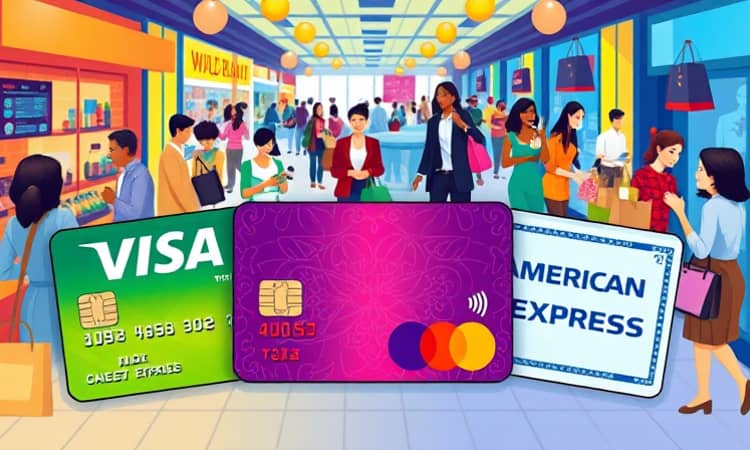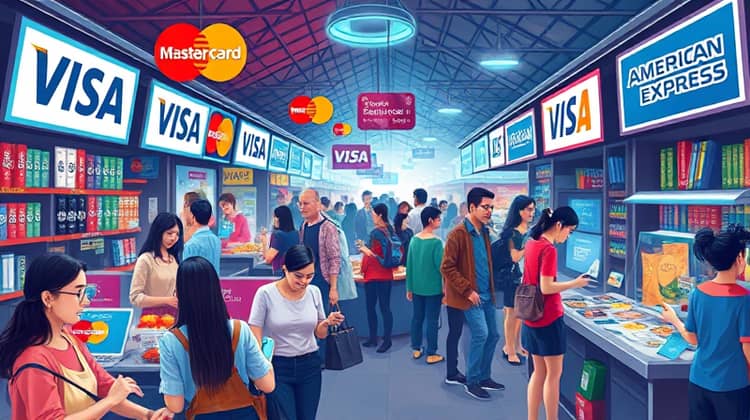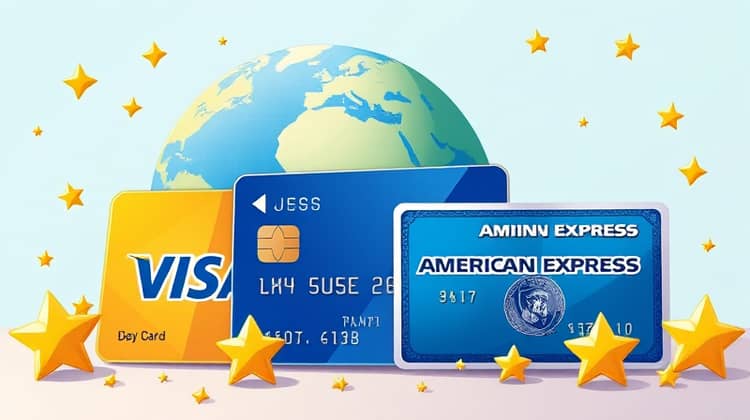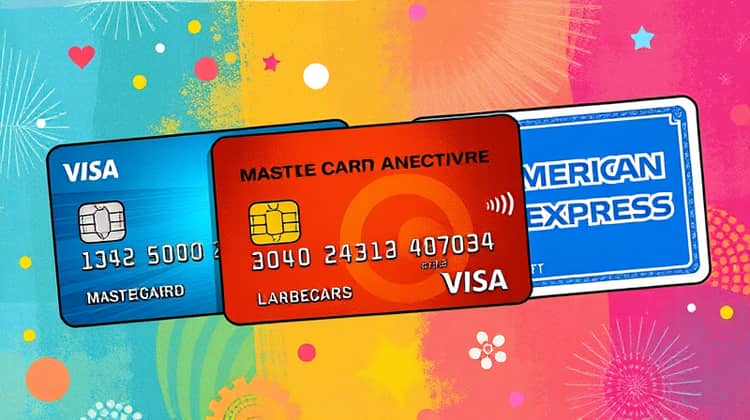Visa vs MasterCard vs Amex: Which Card Should You Pick?

When it comes to choosing a credit card, consumers often face the dilemma of selecting between the three major networks: Visa, MasterCard, and American Express (Amex). Each of these networks offers various benefits, rewards, and features that can cater to different lifestyles and spending habits. Understanding the distinctions between these options can help you make an informed decision that aligns with your needs.
This article delves into the unique characteristics of each credit card network, highlighting the advantages and disadvantages, so that you can confidently choose the card that suits you best. From acceptance rates to rewards programs, we'll cover everything you need to know.
What are Credit Card Networks?

Credit card networks serve as the backbone of card transactions, acting as intermediaries between consumers, merchants, and banks. They facilitate payment processing and ensure that the transaction is securely authorized and settled. Examples include Visa, Mastercard, and American Express, each of which has its own distinct features and benefits.
The main role of these networks is to provide a secure and efficient method for users to make purchases either online or at brick-and-mortar stores. They establish rules, fees, and services associated with their cards, which can lead to significant differences in user experience.
- Visa: Known for its widespread acceptance globally.
- MasterCard: Offers a variety of card options and extensive rewards programs.
- American Express: Focuses on premium benefits and personalized services.
Thus, choosing a card based on the network can significantly impact your experience in terms of acceptance, rewards, fees, and customer service.
Visa

Visa, one of the largest credit card networks in the world, provides a payment platform that is accepted virtually anywhere. Its extensive acceptance is one of the primary reasons consumers opt for a Visa card.
Additionally, Visa offers numerous card options, including student cards, travel rewards, and cash back options, making it a versatile choice for a wide range of consumers.
- Global acceptance at millions of merchants.
- Offers a variety of rewards programs.
- Strong security features with fraud monitoring.
These attributes make Visa a popular choice among consumers who prioritize flexibility and widespread usability.
Mastercard

Mastercard is another leading credit card network that provides users with access to a wide range of financial products. It is recognized for its innovative rewards programs that cater to various lifestyles and spending habits.
The network is continually evolving, introducing features like contactless payments and mobile wallet compatibility, which enhance customer convenience and experience.
- Wide acceptance across millions of locations.
- Innovative rewards and loyalty programs.
- Contactless payment features available.
These advantages make Mastercard an appealing option for consumers who seek both innovation and extensive access.
American Express (Amex)

American Express, often referred to as Amex, is well-known for its premium credit cards and superior customer service. While its acceptance is not as widespread as Visa or Mastercard, it offers unique benefits that can outweigh this limitation for many consumers.
Amex often provides higher rewards rates on travel and dining expenses, appealing to frequent travelers and food enthusiasts.
- Reward points that can be redeemed for travel or shopping.
- Access to exclusive events and offers.
- Enhanced customer service experience.
These differentiating features may appeal to individuals who are willing to invest in annual fees for premium benefits.
Key Differences

Despite their similarities, Visa, Mastercard, and American Express have key differences that can influence which card you choose. One significant factor is acceptance; while Visa and Mastercard are widely accepted almost everywhere, American Express is less commonly accepted at certain merchants, especially smaller ones.
Another distinction lies in the rewards programs each network offers. Visa and Mastercard tend to provide diverse options through partner financial institutions, while American Express emphasizes premium rewards with specific perks.
- Visa and Mastercard have wider acceptance compared to Amex.
- Amex offers more premium rewards over broader options.
- Customer service and added benefits may vary by network.
Understanding these differences can be vital in selecting the card that aligns best with your spending habits and preferences.
Choosing Between the Three

When faced with the decision of which credit card network to choose, consumers should consider multiple factors that can affect their usage. The right card can enhance your purchasing experience while also providing valuable benefits tailored to your lifestyle.
1. Acceptance
Acceptance is often the first consideration when choosing a credit card. Visa and Mastercard are accepted in millions of locations worldwide, making them the most versatile options for consumers who frequently shop both locally and internationally.
On the other hand, while American Express has made strides in expanding its merchant acceptance, it still does not have the same reach, especially among smaller merchants or in certain countries, which may frustrate cardholders when the card isn’t accepted.
- Visa and Mastercard are universally accepted at most locations.
- American Express may encounter acceptance issues at smaller businesses.
- Always check acceptance before traveling or making purchases.
Therefore, for consumers who prioritize broad accessibility, Visa or Mastercard may be the better fit.
2. Rewards and Benefits
When comparing rewards and benefits, it’s essential to analyze your spending habits. American Express typically excels in offering generous rewards on travel and dining purchases, often with higher point rates that can lead to significant rewards accumulation.
In contrast, both Visa and Mastercard can offer competitive rewards through their partnered issuing banks, resulting in a wide range of card options that might be better for those focused on everyday spending and cash back.
3. Fees
Credit card fees are crucial when deciding which network to choose. While Visa and Mastercard generally have lower annual fees for most cards, Amex typically features higher fees reflecting its premium offerings and benefits that come with it.
Consumer should weigh these fees against the rewards and benefits they expect to utilize from the card to see which offers the best overall value.
- 1. American Express often comes with higher annual fees.
- 2. Visa and Mastercard typically offer lower fees adapted to various card tiers.
- 3. Look for 0% introductory APR offers for savings with Visa and Mastercard.
Understanding fees can prevent unpleasant surprises and help consumers select the best value credit card.
4. Customer Service
Customer service is another essential factor to consider. American Express is renowned for its dedicated service and responsiveness, providing cardholders with a level of support that goes beyond typical expectations. Many users report satisfaction with quick resolutions and personalized assistance.
In contrast, Visa and Mastercard rely on their issuing banks for customer service, which can vary significantly in quality.
5. Security Features
Security is paramount in the world of credit cards, and all three networks have implemented measures to protect their users. American Express is notable for its real-time fraud detection and zero liability policy, ensuring peace of mind for their cardholders.
Visa and Mastercard also employ robust fraud protection methods, although the specifics can depend on the issuing bank.
- 1. American Express provides comprehensive security and fraud detection.
- 2. Visa and Mastercard offer reliable protection, typically via issuing banks.
- 3. Always monitor accounts regularly for suspicious activity.
Having a secure card is crucial for a worry-free spending experience, allowing you to shop confidently.
Conclusion

In conclusion, choosing between Visa, MasterCard, and American Express ultimately depends on your personal needs, lifestyle, and preferences. Visa and MasterCard provide extensive acceptance and varied rewards options, while American Express specializes in premium services and exclusive benefits.
Consider acceptance rates, rewards, fees, customer service, and security features when selecting a network that aligns with your spending habits. Each card has its own strengths that would suit different cardholders in various circumstances.






